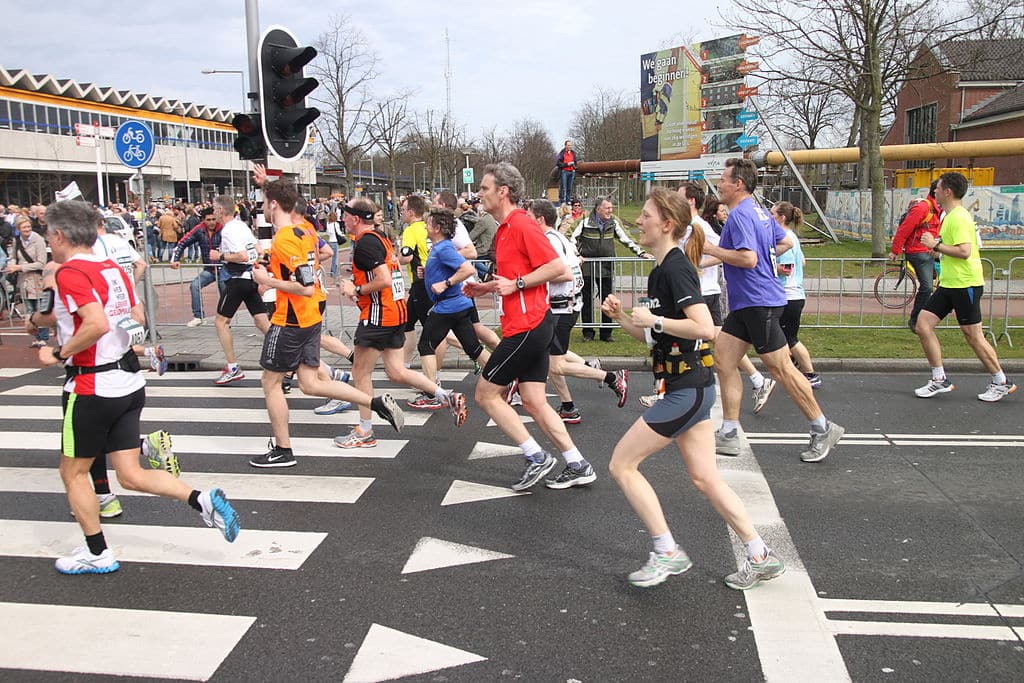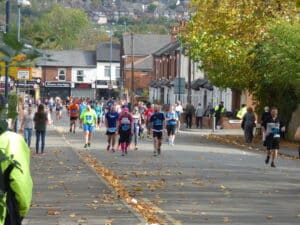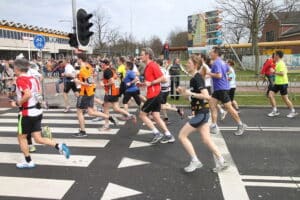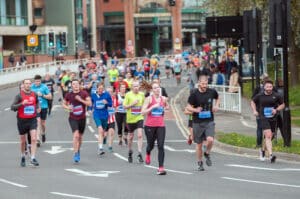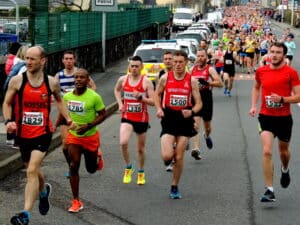You may have your reasons for wanting to run a half marathon without training. Perhaps your job schedule became too hectic, and you were unable to complete your Half Marathon training plan.
Perhaps you became ill and found it difficult to stay motivated after you recovered. Maybe your half marathon was cancelled, so you didn’t bother training, but now your half marathon is approaching, and you’re wondering whether it’s too late to try.
All of these things happen to the finest people for a variety of reasons. Don’t do it, is the best advice that I can give in answering the question that can you run a half marathon without training.
Return to run another Half Marathon when you’ve had time to fully prepare. Do not attempt to run a half marathon without prior preparation! There are several dangers and harmful consequences.You’ll thank yourself in the end for delaying your half marathon until you’ve properly prepared. It will also benefit all of the muscles that were used while running.
Running a Half Marathon Without Training
Before you start any running event without training, you should be aware of a few key considerations.
To begin, check to see whether you have any underlying medical concerns. If you’re not a seasoned runner, it’s critical to have a fast check-up to ensure you’re healthy enough to exercise.
Now that your doctor has given you the all-clear, it’s time to assess your current fitness level. Try walking a mile in less than 18 minutes to see how fast you can go. Stop right now if walking a mile becomes difficult or your breathing pattern changes.

IS IT POSSIBLE TO WALK A HALF MARATHON WITHOUT TRAINING?
Most people can walk a half Marathon without any prior preparation. While it is not suggested, most individuals are accustomed to walking at least a few kilometers every day.
So, in principle, you’re already used to walking 14 kilometers every week. So, if you want to walk the whole 21.1 kilometers in the future, consider adding a few more kilometers to your regular routine. This can be accomplished by parking your car further away from work, taking a short evening stroll, or committing to a weekly walk. Then, as the event approaches, aim to increase the distance each week.
Walking a half Marathon is far simpler for most individuals than running one for the first time. So, for total novices who have never run a step in their lives, start by walking the distance or combining running and walking? After all, it will be a far more fun and secure experience.
HALF MARATHON RUNNING FOR THE FIRST TIME
You should be able to perform runs of 11 miles (17.7 km) or more to be physically prepared to run a half-half Marathon for the first time. While this is a fair bet, if you can run and walk for 10 miles (16.09 km), you should be able to easily complete your first half Marathon.
Your workout should be done at a conversational speed. This implies that you should be able to have a conversation without exhaling significantly.
Increasing your weekly mileage is certainly a key aspect in determining your fitness for the race. But keep in mind that consistency is vital, and doing too much too quickly might result in injury and exhaustion. So, instead of focusing on weekly distance, gradually increase your longest run of the week.
If you’re prone to injuries or lack desire, incorporating cross-training into your routine can help you stay injury-free while also giving you a break from pounding the pavement. It will also aid in the preparation of your muscles for longer runs without the impact of road running.
TIME FOR A HALF MARATHON ON AVERAGE
If you’ve chosen to run a half Marathon, you’re probably curious about what is a good half marathon time on average.
The average half marathon time in the United Kingdom is 1 hour 55 minutes for men and 2 hours 11 minutes for women. You would believe that this is quick, but nations like Russia (1 hour 45 minutes and 11 seconds) and Belgium (1 hour 48 minutes and 1 second) are already far quicker.
If this is your first race, these times may provide another incentive to not attempt a half marathon without prior preparation.
WHAT ARE THE CONSEQUENCES OF NOT TRAINING FOR HALF MARATHON?
A local half marathon showed up on your radar a few months ago. Because your pals had agreed to do it, you reasoned, “Why not?” After that, life occurred. You just did not get out for those training runs as frequently as you should have…pretty much at all. It was all you could do to fit a few gym exercises, yoga lessons, bike rides, and treadmill sessions into your week. However, when Race Day approaches and your buddies are ecstatic, you decide, “What the heck, let’s do it!”
“What the heck?!” is correct says Janet Hamilton, C.S.C.S., a licenced clinical exercise physiologist and the founder and head coach of Running Strong Professional Coaching in Atlanta.
“It makes the hair on the back of my neck rise up to think that someone could just walk out the door and run a half without any training.”
You, on the other hand, claim to be in excellent health. “We can presume you’ve got a fair degree of aerobic fitness if you’re under 30, within five pounds of your target body weight, and you undertake 45 to 90 minutes of strenuous physical exercise every day,” Hamilton adds. “But nothing puts the same tissue pressures on the muscles, tendons, and ligaments of the legs as running does—not bicycling, swimming, elliptical, kickboxing, or anything else”. Translation: if you’re going to run a half marathon, you should be running regularly to prepare.
You argue that there is no turning back and that you must go for it. That’s a terrible idea, Nelly! Here’s how your body might react:
You'd be in pain
Even for individuals who have prepared properly for the race, micro-tears in the leg muscles occur throughout a half marathon, resulting in post-race pain. The untrained runner is significantly more susceptible to them, so pains might start while you’re still running and will only become worse later.
You might potentially sustain tendon injury that is more significant and long-lasting, resulting in tendonitis or tendonosis long after the race is over. Stress fractures are also a possibility, especially if you have osteopenia that hasn’t been detected (the precursor to osteoporosis).
You May Experience Extreme Heat (Or Really Cold)
Temperature management is difficult for an active body, particularly one that is sweating profusely. You may be deprived of electrolytes if you suddenly experience the chills after working up a sweat.
While this may happen to any runner who doesn’t properly hydrate or nourish her body, it’s more concerning if your system hasn’t been conditioned for this sort of endurance action. “When you’re not in good shape, you tend to sweat in a more concentrated manner, which means more electrolytes are expelled than when you’re in good shape,” Hamilton explains. “Unlike someone who has run a lot of lengthy distances, your body hasn’t learnt to save those resources”.
Untrained runners are not only less effective at temperature management, but they are also more prone to overheat since they are working more to maintain their pace than someone who has put in the miles prior.
TIPS FOR RUNNERS BEFORE GOING TO HALF MARATHON
1. Drink Plenty Of Water And Eat Plenty Of Food.
This is crucial since the half marathon is no laughing matter, and it is a lengthy race. This should be done both before and during the race.
If feasible, use the hydration stations provided by the event organisers and drink some fluids every 5k. If your only aim is to finish the half marathon, you can also stop at such stations and eat a little something.
If you’re racing at a specific pace, you can bring your own gels and consume them after the first half. I recommend that you do this at least twice throughout your runs because not everyone tolerates them well at first. This will save you from having a stomachache at the end of the day.
2. Put On Comfy Shoes And Clothing.
On race day, do not try on your fresh new sneakers. Run with something you’re familiar with and that feels nice on your feet. The same may be said of your running gear in general. Blisters and other skin problems will be avoided as a result of this.
3. Set A Sensible Objective For Yourself.
Do not have unrealistic expectations for what should occur. Relax and take in everything you’ve learned. If it’s your day and you’re running well, that’s fantastic! If things don’t go as planned, take what you’ve learned and use it to improve next time.
4. Keep an Eye on Your Running Pace
The pace at which you run is measured in minutes per mile also known as running pace calculator. You must run or walk at a speed that you can maintain for 2 to 4 hours.
The most common error novice racers do is to begin the race too quickly, which is simple to do because you are thrilled and will be compelled to keep up with those around you. You will only succeed in squandering energy and rapidly burning out, making the remainder of the race much more tough.
Ignore the rest of the world, let them pass you by, and concentrate on your own task. If you want to know that you’re running at a good speed, pay attention to your breathing.
5. The Day before the Race
Go to the expo, pick up your race packet, pin your race number to your shirt and your timing chip to your shoe (if available), lay out everything you’ll wear and bring to the race, trim your toenails as short as possible, charge any devices you’ll be using during the race, and figure out how to get to the starting line and where you’ll go after the race.
Drink plenty of water throughout the day and eat normally. Avoid consuming high-fat, high-carbohydrate foods or foods that you are unfamiliar with. If you know what I mean, you don’t want your intestines dealing with all of that when you’re running.
6. During the race.
Be aware of your breathing and speed remembers, slow and steady! If you experience a side cramp, breathe in and out in a 2:2 rhythm, exhaling on the foot opposite the spasm. Stop and extend your leg or hip as often as you need to if you experience a cramp.
Drink at the water stations to stay hydrated, and take an energy gel every 45 to 60 minutes to keep your body fed. There will most likely be portable toilets at a few locations throughout the race route in case you need one, as well as a few medical tents if you want assistance.
Frequently Asked Questions
In eight weeks, most C25K programmes will take you from zero to three miles. Give yourself at least 12 weeks to train for 13.1 miles once you hit 3 miles. This is a 20-week half marathon training programme.
If you’re a runner who’s used to running 5k or 10k distances, you should be able to go around if you set your objectives appropriately and run at a very moderate speed. Most individuals could walk 26.2 miles in six and a half hours if they walked quickly at 15 minutes per mile.
Better blood flow, stronger muscles, higher endurance, having more energy, feeling happier, lower chance of a heart attack, controlled blood pressure, living longer are just a few of the health and fitness advantages of half marathon training.
These meals can help you recover faster after a half marathon! Wild meat, apples, dairy products, green tea, oily fish, and pineapple are all examples of dark green salad leaves.
Conclusion
You can find yourself in a position where you’ve trained moderately yet realise your preparation was insufficient once you’re in the half marathon. You might be able to slow down and finish the half marathon by walking or employing the run-walk approach at that time. This will have a far lower impact and stress on your body, and it may be a better option than stopping.
Even walking a half marathon, however, is taxing on the feet, joints, ankles, and knees. If you’re still confusing on can you run a half marathon without training then the straight answer is we don’t advocate walking a half marathon without training if you haven’t walked at least 20 miles in one goes in the last month or so.
RELATED ARTICLES

